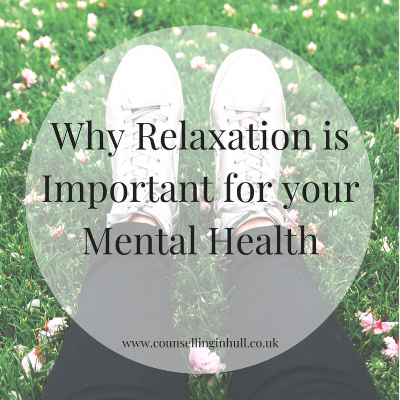Why Relaxation Is Important For Your Mental Health
For a number of reasons, the majority of people do not relax enough. Which of these is you?
"I can't (relax) until..."
"I don't have time for that"
"I'm a parent, it isn't realistic (to relax)"
"I have a high demanding job which takes all my time"
Does putting a list of house chores in front of me-time, or working yourself into the ground sound familiar?
Here are some of the ways you are impacting your mental health if you do not slow down and create time for yourself:
Stress & Anxiety
You increase the chances of experiencing stress (your body's response to a situation) which can then trigger feelings of anxiety (reaction/symptom of stress). Stress in small doses can be really useful in helping our motivation and achieving deadlines, however long-term or chronic stress can have both physical and psychological implications.
You can read more about stress indicators and what you can do to manage it here.
Emotional Changes
If you're not creating time for relaxation, it's highly likely you're also not allowing time to process your life day-by-day. If you're keeping yourself busy, this can be with work or a busy social/family life then when do you take stock, think about your reactions and thoughts through the day?
Life can be challenging and if we are not aware of our emotional and cognitive reactions to parts of the day, then in effect we create a bank account, a collection of all incomplete or unprocessed events. Over time, this collection can spill out and present as anxiety, anger, resentment and depression. At this point, because it's a combination of many things over a long period of time, it's difficult to effectively manage it, because it's no longer clear what the issue is.
Behavioural Changes
If you're experiencing stress and a build up of emotions, this can effect your sleep, your diet, your relationships and how you feel about yourself. You may find that you withdraw from your support network at a time when accessing it would be beneficial.
To cope you may find yourself using alcohol and habits such as smoking more frequently.
Physiological Changes
Prolonged stress can have short and long term implications on your body too, regularly reported symptoms are head aches, tension, palpitations and increased perspiration. These symptoms can disappear when the stress levels are reduced, however clients often report irritable bowl, stomach ulcers and cardiovascular conditions.
Everyone can experience stress but if creating time to relax will help reduce these effects and will positively impact your life.
Click here if you want to know 5 ways you can relax now!
Other Blogs You May Find Useful:
6 Steps to Improving your Well-being

